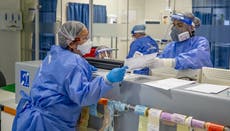Coronavirus: Government testing sewage water to reveal local Covid-19 hotspots
Ninety treatment sites in England, Wales and Scotland testing waste water for traces of virus
Your support helps us to tell the story
From reproductive rights to climate change to Big Tech, The Independent is on the ground when the story is developing. Whether it's investigating the financials of Elon Musk's pro-Trump PAC or producing our latest documentary, 'The A Word', which shines a light on the American women fighting for reproductive rights, we know how important it is to parse out the facts from the messaging.
At such a critical moment in US history, we need reporters on the ground. Your donation allows us to keep sending journalists to speak to both sides of the story.
The Independent is trusted by Americans across the entire political spectrum. And unlike many other quality news outlets, we choose not to lock Americans out of our reporting and analysis with paywalls. We believe quality journalism should be available to everyone, paid for by those who can afford it.
Your support makes all the difference.The government has begun analysing sewage water from across the UK for traces of coronavirus to determine Covid-19 spikes in areas where few people are being tested.
It is hoped the programme, led by the Environmental Department (Defra), will provide an early warning for local outbreaks before they escalate in size.
Defra said the project had already worked successfully in an area of the southwest of England, where sewage sampling showed a spike in coronavirus material as a result of several asymptomatic cases.
The testing, which is being overseen by central and local government, along with academic institutions and water companies, has been rolled out in 90 waste treatment sites across England, Wales and Scotland.
Data from the analysis is being shared with the Joint Biosecurity Centre as part of Test and Trace, officials said.
Fragments of the coronavirus are passed out from people's bodies when they use the toilet. The detection of the material, which is not infectious, can indicate when a local community is having a spike in cases.
Officials said the results of testing can give local health teams a clearer idea of infection rates by identifying where there are high numbers, particularly of asymptomatic carriers and people before they start showing symptoms.
This can help them take early action to slow the spread of the virus.
Professor Davey Jones, an expert in soil and environmental science at Bangor University, helped to show that viral levels in wastewater corresponded with the success of lockdown measures during the first wave.
"We have been monitoring viruses like norovirus and hepatitis in human sewage for the last decade,” he said. “We added Covid-19 to the list in March this year."
In England, 22 per cent of the population is covered by 44 sites, with plans to expand the programme further.
There are also 24 sites in Wales and 28 in Scotland where sampling is being done. The projects are being led by the devolved administrations and the UK government coordinating the findings.
Environment secretary George Eustice has acknowledged that these waste tests are not a substitute for an effective test-and-trace regime, but described the scheme as an "added tool in the box".
"This is a significant step forward in giving us a clearer idea of infection rates both nationally and locally, particularly in areas where there may be large numbers of people who aren't showing any symptoms and therefore aren't seeking tests,” he said.
"NHS Test and Trace is able to use the science to ensure local health leads are alerted and can take action."
Health secretary Matt Hancock said the project would help Test and Trace, along with local authorities, to “target hotspots quickly and effectively”.
"This initiative is just one example of how we are working across government and with local partners to find innovative, new ways to track the outbreak, slow the spread of the virus and save lives,” he said.
Separate work carried out by the National Institute for Biological Standards and Control (NIBSC) also identified coronavirus material in London sewage in February before cases were recorded in the area.



Join our commenting forum
Join thought-provoking conversations, follow other Independent readers and see their replies
Comments